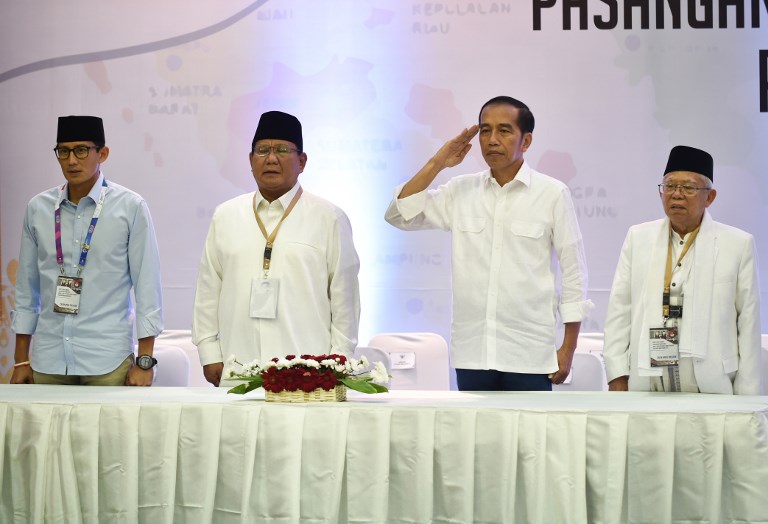With Indonesia’s 2019 presidential election fast approaching, both candidate pairs have yet to go directly head-to-head against each other in a debate. Yet, as one might expect considering the strong influence religion has had over politics in the majority Muslim country in the past few years, they may be made to prove their devotion to Islam first.
The Council of Preachers Association in Aceh recently invited all candidates to take part in a Quran reading test on Jan. 15 in order to “put an end to identity politics” by proving that they are all devout Muslims and therefore one pair would not hold sway over the nation’s Muslim population compared to the other.
The campaign team of Gerindra Chairman Prabowo Subianto and running mate Sandiaga Uno, whose coalition of opposition party backers are more closely associated with and hardline Islamic organizations, were surprisingly quick to shoot down the proposal, saying the public needs to hear candidates talk about more “substantial” issues.
“What the public needs is [to know] what are these candidates offering? To solve the country’s economic problems. That is what I think the more substantial thing the Indonesian public wants discussed at this time,” Prabowo-Sandiaga campaign spokesman Andre Rosiade told CNN Indonesia.
Andre added the timing of the proposed Quran competency test isn’t ideal either, considering that Prabowo and Sandiaga are scheduled to prepare for the first presidential debate on Jan 17.
That said, he said the campaign appreciates the proposal and is open to the idea of a Quran test in future elections.
Prabowo-Sandi’s refusal to take part in the test may hurt their reputation in the eyes of their ultra-conservative Islamic allies. Prabowo in particular has had his Muslim cred come under intense scrutiny this month after he was accused of being a convert to Islam and therefore “less Muslim” than his rival President Jokowi, who was born a Muslim. Prabowo’s campaign has since denied the accusation.
Conversely, the campaign of President Jokowi and running mate Ma’ruf Amin doesn’t seem daunted by the proposal, especially since the latter is still chairman of the Indonesian Ulema Council (MUI), the highest clerical body in the country.
In fact, Ma’ruf said he was up to the challenge.
“If that (the Quran test) is something that what we must attend, then we will attend. I will discuss it with Pak Jokowi. But we are ready if they tell us to attend,” he said.
“It’s not about whether or not [the Quran test] is necessary, but it’s about what the public wants. If there is no Quran test, we have no problem with that either.”
But not everybody within Jokowi-Ma’ruf’s campaign have warmed to the idea. The Indonesian Solidarity Party (PSI), which has recently made headlines for their fervent stance that religion should not mix with politics, says testing presidential candidates on their ability to read any religious scripture is “irrelevant”.
Other than in Aceh (the only province in Indonesia granted special autonomy to enact sharia-based laws) and in religious offices, government officials are not required by law to prove their religious piety in order to take office.
Indonesia will go to the polls on April 17, 2019. There will be five debates before the election date, the first of which is scheduled for Jan 17, in which candidates will be grilled on issues related to law, human rights, corruption and terrorism.




